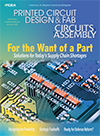Resolved: A New Policy for Tech Planning is Needed

More than 160 years ago, eons before Facebook and Twitter were conceived, a pair of candidates to represent Illinois in the US Senate engaged in a series of debates. As they barnstormed their way around the state, incumbent Democrat Stephen Douglas and his Republican challenger Abraham Lincoln faced off in the heat and rain in front of thousands of citizens.
Known today as The Great Debates of 1858, the respective candidates used the time to frame their positions on the leading issues of the day.
When this issue hits inboxes and mailboxes, this year’s US presidential election will (hopefully) be determined. Among the revelations of the just-ended race is that the format for the presidential debates is all wrong.
No one will mistake President Trump or his challenger, Joe Biden, for Douglas and Lincoln. Their predecessors had erudition and wide-ranging oratorical skills that seem quaint in today’s era of tweets and sound bites. But the format bears revival.
That’s because no matter who your preferred candidate is, the structure of the debates is inherently allergic to communicating the real issues.
To continue reading, please log in or register using the link in the upper right corner of the page.







